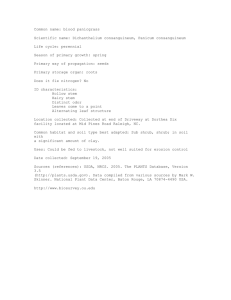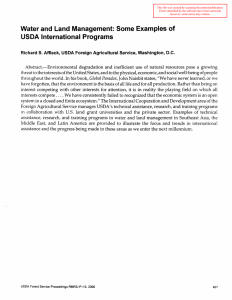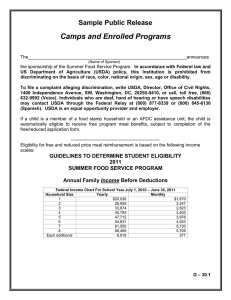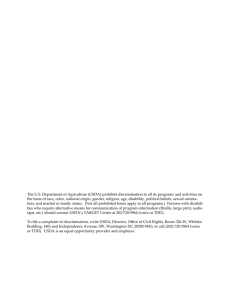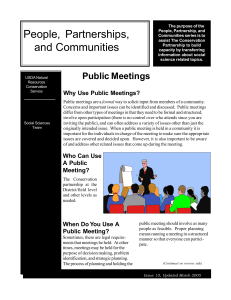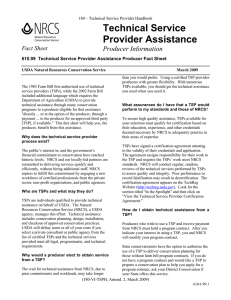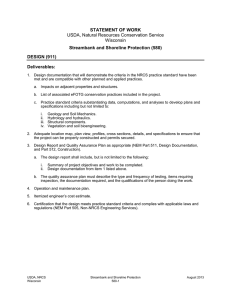People, Partnerships, and Communities
advertisement
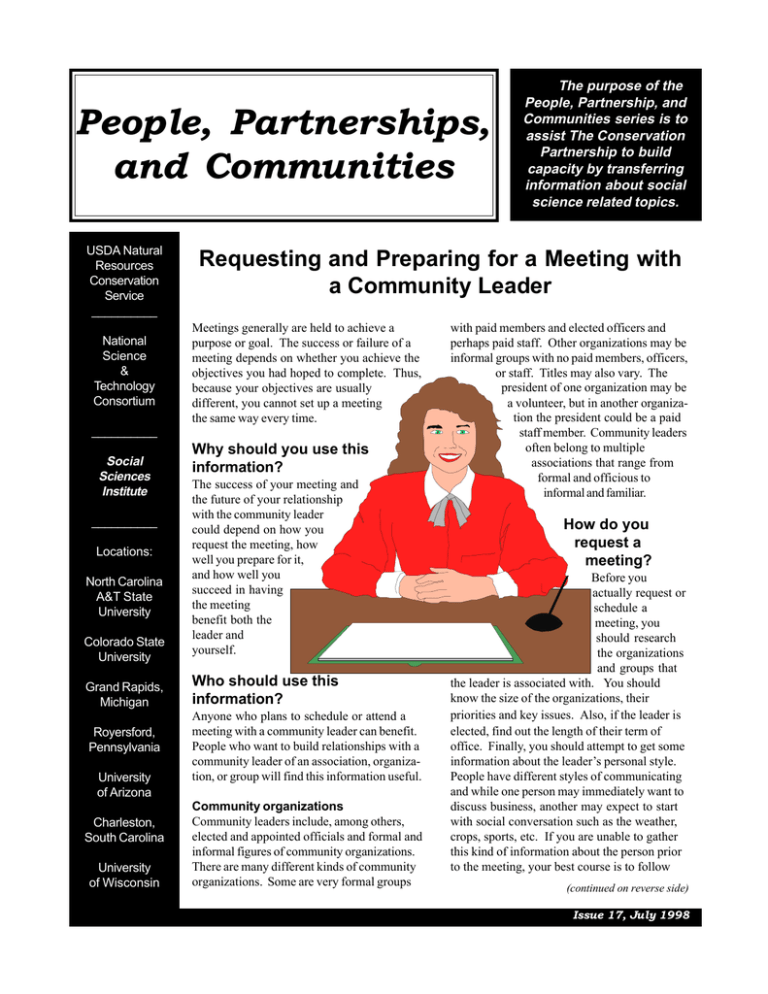
People, Partnerships, and Communities USDA Natural Resources Conservation Service __________ National Science & Technology Consortium Requesting and Preparing for a Meeting with a Community Leader Meetings generally are held to achieve a purpose or goal. The success or failure of a meeting depends on whether you achieve the objectives you had hoped to complete. Thus, because your objectives are usually different, you cannot set up a meeting the same way every time. __________ Social Sciences Institute __________ Locations: North Carolina A&T State University Colorado State University Grand Rapids, Michigan Royersford, Pennsylvania University of Arizona Charleston, South Carolina University of Wisconsin The purpose of the People, Partnership, and Communities series is to assist The Conservation Partnership to build capacity by transferring information about social science related topics. Why should you use this information? The success of your meeting and the future of your relationship with the community leader could depend on how you request the meeting, how well you prepare for it, and how well you succeed in having the meeting benefit both the leader and yourself. Who should use this information? Anyone who plans to schedule or attend a meeting with a community leader can benefit. People who want to build relationships with a community leader of an association, organization, or group will find this information useful. Community organizations Community leaders include, among others, elected and appointed officials and formal and informal figures of community organizations. There are many different kinds of community organizations. Some are very formal groups with paid members and elected officers and perhaps paid staff. Other organizations may be informal groups with no paid members, officers, or staff. Titles may also vary. The president of one organization may be a volunteer, but in another organization the president could be a paid staff member. Community leaders often belong to multiple associations that range from formal and officious to informal and familiar. How do you request a meeting? Before you actually request or schedule a meeting, you should research the organizations and groups that the leader is associated with. You should know the size of the organizations, their priorities and key issues. Also, if the leader is elected, find out the length of their term of office. Finally, you should attempt to get some information about the leader’s personal style. People have different styles of communicating and while one person may immediately want to discuss business, another may expect to start with social conversation such as the weather, crops, sports, etc. If you are unable to gather this kind of information about the person prior to the meeting, your best course is to follow (continued on reverse side) Issue 17, July 1998 People, Partnerships, and Communities their lead. A future PPC will cover this in more detail. You should also make sure the reason for the meeting really requires holding a formal meeting. If you gain the reputation of holding meaningless meetings, people will be less willing to attend future ones that you schedule. However, there is nothing wrong with a meeting specifically designed to introduce you and your organization to a community leader. When you have determined your reason for holding a meeting, contact the office or person you wish to meet with to make an appointment. Have several dates in mind when scheduling a meeting in order to increase the likelihood that one date will be convenient for both parties. Also, be prepared to say what the meeting will be about and how long it will last. If someone in your group/organization has a special contact/ relationship with whom you plan to have a meeting, consider having him or her attend the meeting. Or, you might request the person make an introductory telephone call on your behalf. For example, you are aware District Director Jones is a good friend of Rotary Club president Smith. You might ask Jones to call Smith and indicate you will be calling to schedule a meeting and the general purpose of your meeting. You may be able to set up an appointment from an informal gathering — a town meeting or reception — which the community leader is attending. Introduce yourself, raise the topic, and ask “May I come and see you about this?” If he/ she says yes, you are now set to make a follow-up telephone call to schedule the meeting. when preparing for and attending a meeting with a community leader: • Prepare an informal agenda for the meeting to meet all of your objectives. Put your most important points first in case that is all time permits. • Be on time. • Try to take a seat that will keep you at eye level with the community leader. • Begin with a sincere pleasantry. Like all people, community leaders are put at ease by friendliness and praise. Do your homework. If appropriate, compliment the leader on a recent program or activity. Then, quickly get to the point. • Establish your credibility. Sell yourself with proper attire, a firm handshake, and total command of your topic. If you are meeting with a community leader, you should dress similar to the way they do. For example, if you are meeting in the field you would not wear a suit. If you are meeting in an urban office, you will probably be more comfortable in business attire. • There are three basic questions most people ask before a meeting. These questions are “Why am I here?”, “What are we going to do in the meeting?”, and “What’s in it for me or my organization?” Be prepared to answer those questions from the community leader’s viewpoint. It is an effective way to start the meeting. How do you prepare for a meeting? After you have scheduled a meeting date, it is important to properly prepare to make the meeting a success. • Be familiar with whom you will be meeting. You should know where their organization or agency stands on a topic so you can plan a strategy to present key issues. You would need to plan to take a different strategy if they were in favor of your view, than if they opposed it. Never underestimate nor overestimate the intelligence of whomever you are meeting with. If you overestimate their intelligence or understanding of the issue they may not understand what you are saying or worse yet, misunderstand. You could also bore the audience if you underestimate their knowledge on the topic by telling them something they already know. The following are some other important tips to remember page 2 • Keep your points brief, but concise. You don’t want to bore your audience. Act with confidence even if you don’t feel that way. • Be a good listener. Keep an open mind to ideas presented to you. It helps establish a basis for your future relationship. • When presenting your case, try to put a local spin on the story so those attending can see how the topic (continued on next page) Issue 17, July 1998 People, Partnerships, and Communities relates to them. • • • Bring materials about your watershed, district, RC&D, NRCS and/or the issue you plan to discuss. However, don’t overwhelm the leader with materials. Avoid using jargon. Be prepared to present your case in terms your audience will understand. Don’t interpret difficult questions as hostility. Try to anticipate inquiries and prepare responses. How do you build relationships with community leaders? • Bring your business card or offer those you are meeting with a number of ways they can stay in touch with you. • After the meeting remember to send a “thank you” note and continue to stay in contact with those you met with — you never know when you may be working with them again. Promptly provide any information you promised to send. • Reflect on the meeting. Consider what went well and make it a part of your next interaction. • Think about your next meeting now. You want to build an effective long-term relationship. Community leaders don’t like to hear from people only when they have a problem. Provide periodic updates on conservation activities. Different meetings have different purposes. Each style of meeting may not be appropriate to meet all of your needs. When preparing for a meeting it is important to keep in mind the purpose or goal in order to prepare for the correct type The United States Department of Agriculture (USDA) prohibits discrimination in its programs on the basis of race, color, national origin, sex, religion, age, disability, political beliefs, and marital or family status. (Not all prohibited bases apply to all programs.) Persons with disabilities who require alternative means for communication of program information (braille, large print, audiotape, etc.) should contact the USDA Office of Communications at (202) 720-2791. To file a complaint, write the Secretary of Agriculture, U.S. Department of Agriculture, Washington, DC 20250, or call 1-800-245-6430 (voice) or (202) 7201127 (TDD). USDA is an equal employment opportunity employer. page 3 of meeting. Listed below are five different types of meetings you might schedule with a community leader. The purposes of these meetings are also listed. Fact Finding- collect specific kinds of data or studies. Advisory- give or seek advise on policy, technical matters, programs, procedures, studies, and so forth. Program- plan a program for specific events including demonstrations, a conservation fair, educational activities, etc. Public Relations- keep the public informed about the purposes, goals, activities, and accomplishments of the organization or agency. Coordinating- mesh the activities of two or more organizations, committees, or other groups. Where do I find more information? USDA NRCS Social Sciences Institute. Identifying Community Leaders: People, Partnerships and Communities Series. 1998. USDA NRCS Social Sciences Institute. Running Effective Meetings: People, Partnerships and Communities Series. 1997. USDA Soil Conservation Service. Leadership Identification and Group Dynamics, Sociological Training Module 4. Washington, DC: 1990. Kretzmann, John P., and John L. McKnight. Building Communities from the Inside Out: A Path Towards Finding and Mobilizing a Community’s Assets. Evanston, Illinois: Northwestern University, 1993. Oleck, Howard L., and Martha E. Stewart. Nonprofit Corporations, Organizations & Associations. Englewood Cliffs, NJ: Prentice Hall, 1994. USDA NRCS Social Sciences Institute. Expanding Your Customer Base: People, Partnerships and Communities Series. 1998. Issue 17, July 1998 People, Partnerships, and Communities page 4 Social Sciences Institute staff & locations For more information about the Social Sciences Institute, contact: Frank Clearfield, Director Frank Clearfield, Director Social Sciences Institute North Carolina A&T State University Charles H. Moore Building, A-35 Greensboro, NC 27411 (336) 334-7058 clearf@ncat.edu (see next column) Kim Berry, Sociologist Greensboro, NC (336)334-7464 berryk@ncat.edu Kevin P. Boyle, Economist Madison, WI (608) 262-1516 kboyle@ssc.wisc.edu Gail Brant, Sociologist Royersford, PA (610) 792-9207 gbrant@po.nrcs.usda.gov Visit the SSI Homepage: http://people.nrcs.wisc.edu/ socsciinstitute Andrea Clarke, Social Scientist Fort Collins, CO (970) 498-1895 aclarke@tasc.usda.gov Product Catalog Available James Cubie, Policy Analyst Charleston, SC (843) 740-1329 jim.cubie@agconserv.com Are you interested in materials that assist you in implementing locally-led conservation? Or, are you curious about the products available from the Social Sciences Institute? Michael Johnson, Cultural Anthropologist Tucson, AZ (520) 626-4685 mdjnrcs@ag.arizona.edu For a free catalog, contact the Social Sciences Institute. Telephone: (616) 942-1503. Email: bwallace@po.nrcs.usda.gov Jeffrey Kenyon, Sociologist Madison, WI (608) 265-3646 jkenyon@ssc.wisc.edu Barbara Wallace, Community Planner Grand Rapids, MI (616) 942-1503 bwallace@po.nrcs.usda.gov Issue 17, July 1998
